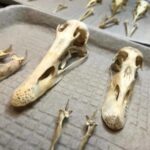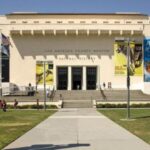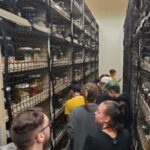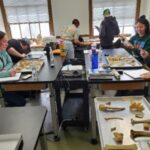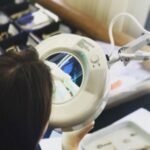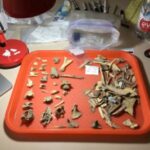2024 US (CA): Zooarchaeology theory & practice
Open
Jun 17-Jul 12, 2024
Archaeology, Zooarchaeology
Dr. Aharon Sasson & Dr. Amy Gusick
$3,425
April 5, 2024
Apr 14, 2024 1:30pm Pacific Time
8 Semester credits
This program is lab based. No excavations will take place.
This program DOES NOT provide accommodation or food. See below options for students who are coming from outside the Los Angeles area
OVERVIEW
The zooarchaeology course at the Natural History Museum Los Angeles County (NHMLA) is designed to be a fun and diverse learning experience. The hands-on zooarchaeological instruction will take place at the Archaeological Laboratory at NHMLA, but we take full advantage of the unique museum setting. We provide introductions to various museum careers, behind-the-scenes tours to multiple museum departments and collections (e.g., mammalogy, ornithology, taxidermy, scanning electron microscope lab) and see how faunal specimens are displayed in the main museum public exhibits (e.g., Dinosaur Hall, Age of Mammals). We also provide an introduction to paleontology with an instruction day at the La Brea Tar Pits.
Did you know that faunal remains are one of the most abundant finds in archaeological sites? Zooarchaeology, the analysis of animal bones from archaeological sites can shed light on human behavior, diet, economic and hunting strategies as well as natural and cultural site formation processes. We will learn the most current techniques for describing, classifying and analyzing archaeological animal bones and we will discuss faunal assemblages from archaeological sites in Afro-Eurasia and the Americas.
The first half of the course will focus on learning skeletal anatomy and identifying skeletal elements of modern animal species. The second half of the course will be devoted to working on zooarchaeological assemblages from sites in southern California. We will practice identifying, classifying, and cataloging faunal remains and taphonomic agents. We will build a zooarchaeological database, conduct data analysis and write a faunal report based on zooarchaeological data we collected.
This program is lab based. No excavations will take place, we will focus on methodological analysis of faunal remains in a lab setting.
Instructors
All field school directors are experts in their field and passionate about their work. To discuss the suitability of this program for your career goals – whether within or outside academia – you are invited to contact the directors directly. For a broader discussion which CFS program to choose, you are welcome to contact our staff directly – you can do that through our “Contact Us” page.
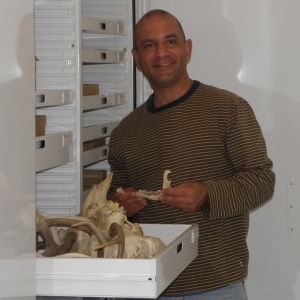

Dr. Aharon Sasson
San Diego Natural History Museum
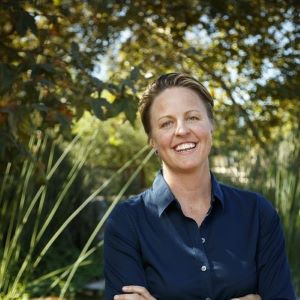

Dr. Amy Gusick
Natural History Museum Los Angeles County
Testimonials


From 2023 Student Evaluations


From 2023 Student Evaluations


From 2023 Student Evaluations
student fees (Tuition)
what is covered
-
DEPOSIT IS PART OF TOTAL TUITION COST
-
Costs of Instruction
-
Costs of Instruction
-
Cost of Academic Credit Units
read before you pay
- Application: You must apply online for this program – application is free
- Deposit: A $300 nonrefundable deposit (part of the total tuition cost) is required to secure a space in the program
- Credit Card Fee: Payments with credits cards incur 2.5% processing fee
- Late Fee: A $100 Late Fee will be added to the program costs if tuition is not paid in full by payment deadline
- Cancelation Policy: Carefully read our Cancelation Policy before committing to attend our programs
- Trip cancellation Insurance: Trip cancellation insurance is not provided by CFS. Such policies have changed due to Covid 19. If you wish to purchase an insurance policy that covers pandemic contingencies, explore Cancel for Any Reason (CFAR) plans. Insuremytrip or Travel Guard are possible websites where you may explore different insurance policies
Accommodations
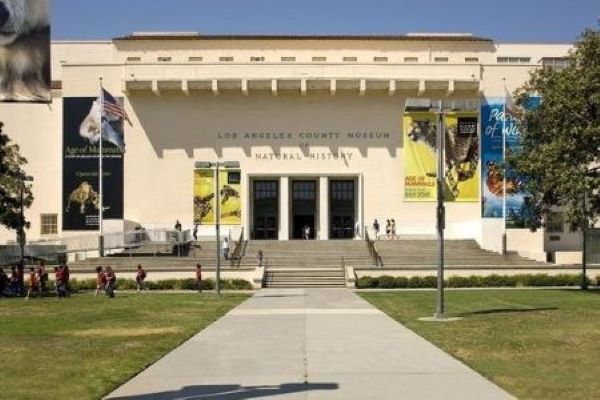

This is a non-residential program and accommodations are not provided. The University of Southern California (USC) is across the street from NHMLA, within walking distance to the museum. USC offers Guest Housing options for the summer. These tend to be less expensive than other hotel accommodations. These options are on a first come/first served basis and registration for USC Summer Guest Housing opens at the end of February/early March 2024. For more information you can email: summer.conferences@usc.edu.
diet


This is a non-residential program and food is not provided. For lunch breaks, there are several food options near the Natural History Museum, Los Angeles. Students may also bring their own lunch, as there are refrigeration options available for their use on the museum premesis.
travel information
We suggest you hold purchasing airline tickets until six (6) weeks before the program begins. Natural disasters, political changes, weather conditions & a range of other factors may require the cancelation this field school. CFS typically makes a final Go/No Go decision about six weeks before the field school begins. To protect students from potential financial loss, we urge students to purchase airline tickets only six weeks prior to program beginning.
Students are expected to arrive at the Los Angeles NHM on Monday, first day of your session, by 9:00am.
visa information
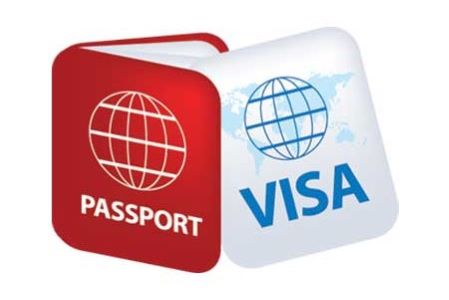

This is a domestic program. No visa is required for US Citizens.
Meeting Point
| Date | Time | Location |
|---|---|---|
| Jun 17, 2024 | 9:00am | Entrance to the Los Angeles Natural History Museum |
If you are delayed arriving to the first day of the field school, please call, text or email project director immediately. A local emergency cell phone number will be provided to all enrolled students.
Safety
Our primary concern is with education. Traveling and conducting field work involves risk. Students interested in participating in our programs must weigh whether the potential risk is worth the value of education provided. While risk is inherent in everything we do, we do not take risk lightly. We engage in intensive review of each field school location prior to approval. Once a program is accepted, we review and monitor each program annually to make sure it complies with all our standards and policies, including student safety.
Students attending our international programs are covered by a comprehensive Health Insurance policy that includes physical illness or injury, mental or chronic conditions. There are no deductible and 100% of costs are covered up to $250,000. In addition, we provide Political & Natural Disaster Evacuation policy, which allow us to remove students from program location if conditions change.
Students attending our domestic programs (within the US) must have their own health insurance and provide proof upon enrollment. Program directors are familiar with local authorities and if in need of evacuation, local emergency services and/or law enforcement will be notified and activated.
We have an explicit and robust harassments & discriminations policies. If students feel they cannot discuss personal safety issues with program staff, they are welcome to call the CFS emergency hotline and talk directly with CFS staff members.
Call (+1 562 584-0761) or email (info@fieldsciences.org) if you have questions about the safety of any program.

